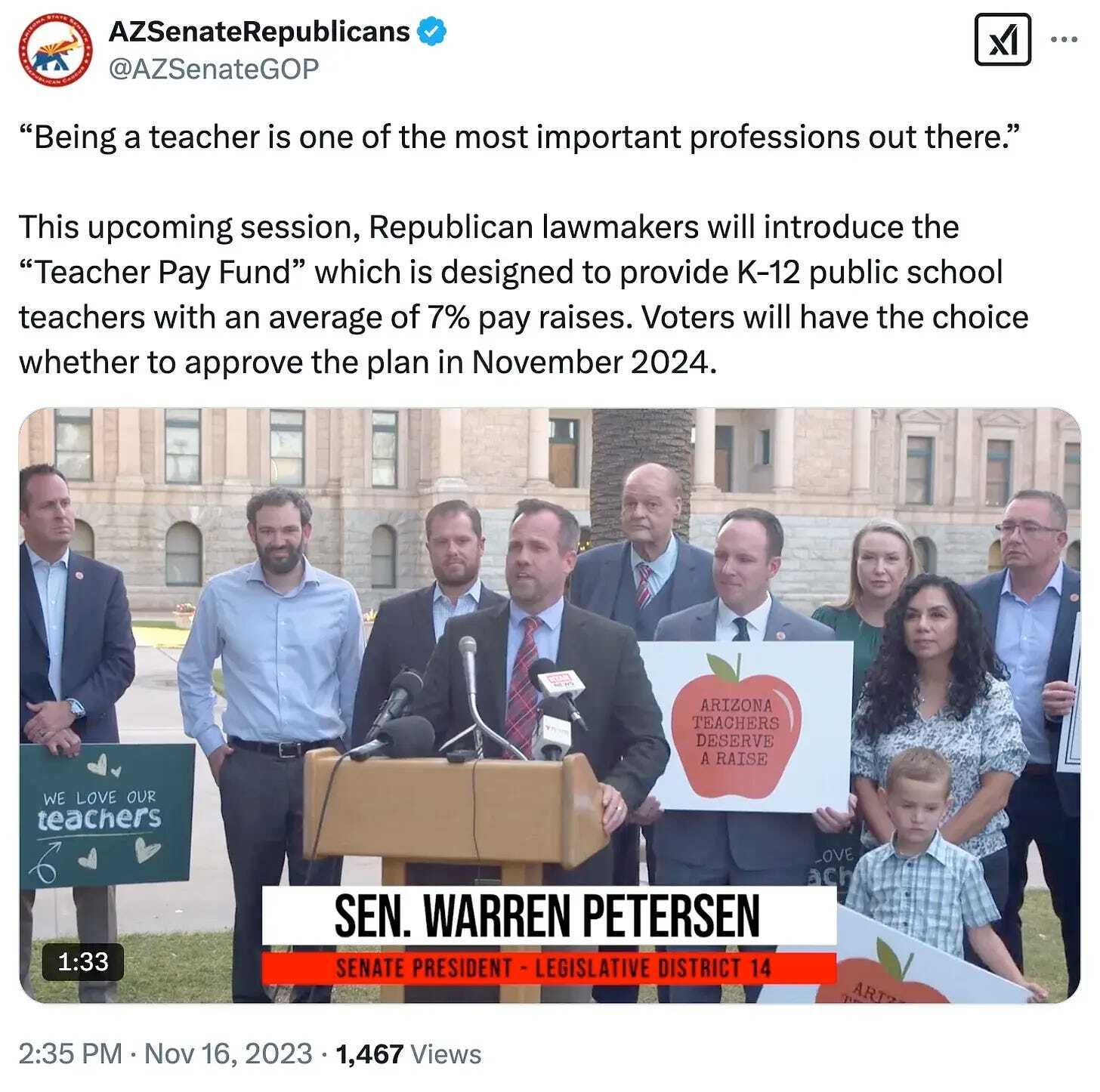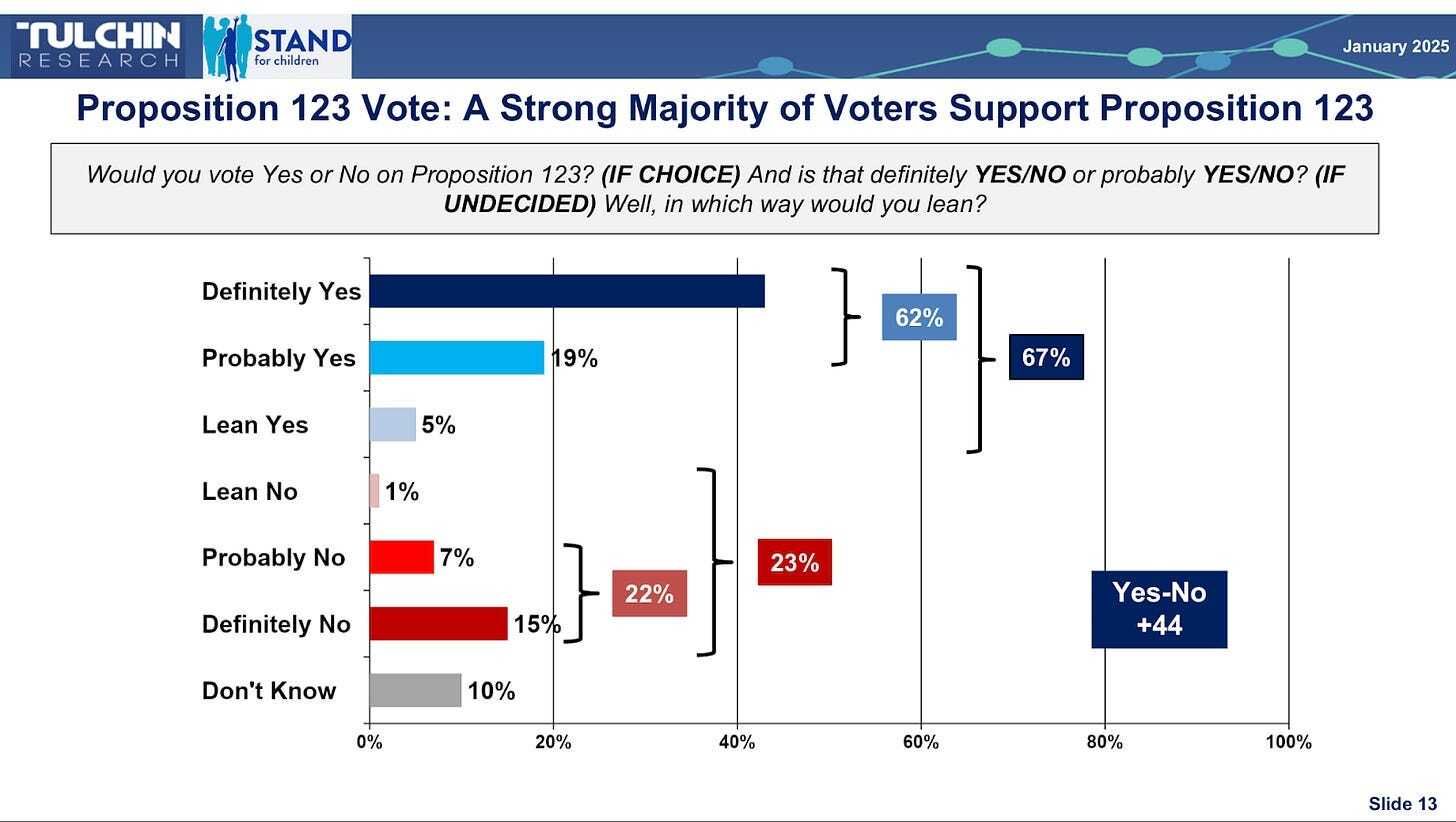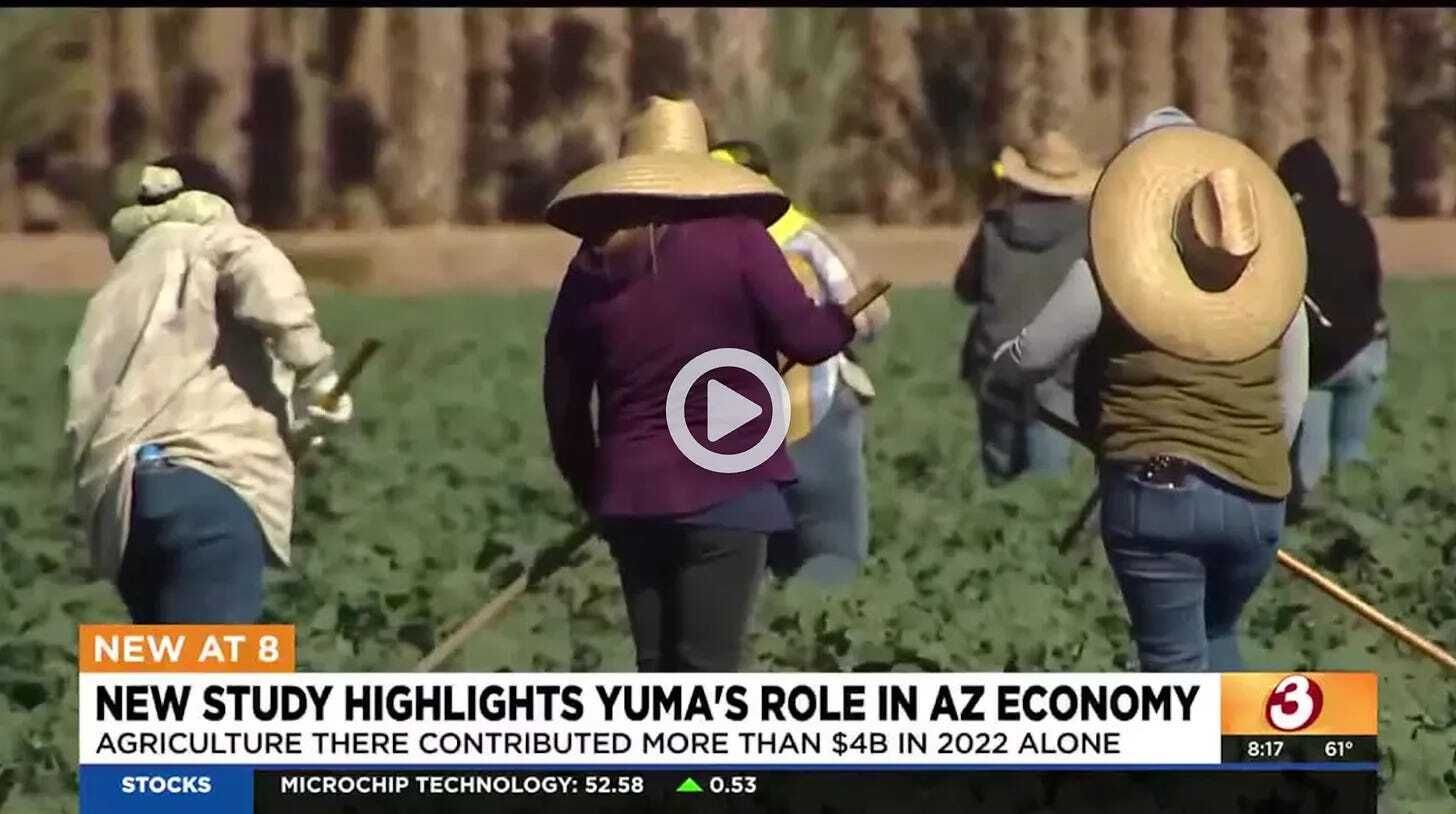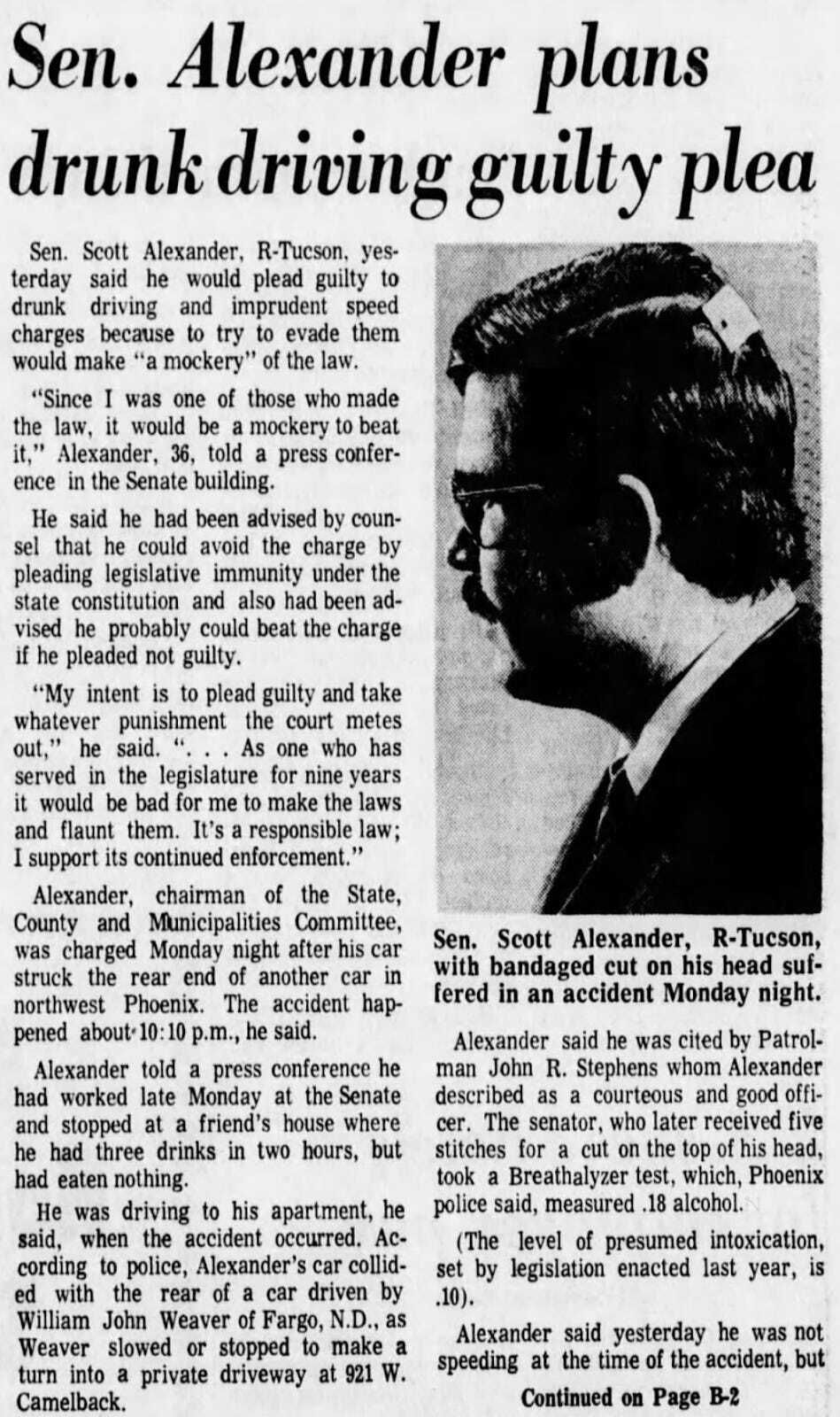In July, Arizona schools will lose a guaranteed revenue stream of roughly $300 million annually.
In its place, schools are getting promises from politicians that they’ll “backfill” the lost funding and continue working on a plan to replace the funding source: Proposition 123.
But at this point, even the biggest champions of extending Prop 123 say they have no choice but to let it expire on July 1.
While the legislation that lawmakers advanced to continue Prop 123 still claims that the issue will be sent to a ballot sometime in 2025, its sponsor, Republican Rep. Matt Gress, told us that’s not actually his aim: He wants to send it to the ballot in November 2026 and have the state backfill the funds for 18 months in the meantime.
The final lines of the legislation renewing Prop 123:"2. The Secretary of State shall submit this proposition to the voters at a special election to be held for that purpose on ____, 2025, as provided by article XXI, Constitution of Arizona."
He’s not alone. The idea of postponing the renewal of Prop 123 has been gaining steam as negotiations continue to drag on. It’s part logistical and part strategic: It’s almost too late to call a May election to renew Prop 123 before it expires, and there’s no campaign infrastructure to get it across the finish line with voters, even if lawmakers had a solid plan ready to go.
We’d like to take this opportunity to brag that we saw this coming, and we previously explained the arguments in favor of putting off a vote until 2026. And for a whole podcast of Ducey alumni reliving the battle over Prop 123 and debating the merits of a 2026 ballot referral, check out the latest edition of “Scarp and Friends".
Prop 123, for the uninitiated, is an amendment to the state Constitution that lets Arizona draw more money from the State Land Trust to boost school funding than otherwise allowed. It was former Gov. Doug Ducey’s way to settle a monumental lawsuit from schools arguing that lawmakers had illegally cut their funds during the Great Recession.
Voters narrowly approved Prop 123 during a special election in 2016 amid fears that it would draw so much from the trust that it would rob future generations. But the land trust has consistently achieved returns above the draw amount and has continued to grow over the last decade.
Lawmakers have had nearly 10 years to plan for the day Prop 123 expires.
The need to extend it is so universally accepted that 15 months ago, even members of the uber-conservative Freedom Caucus stood shoulder-to-shoulder promising to send a plan to the ballot in November 2024.
But that never happened.

On Tuesday, lawmakers finally took the first baby steps toward sending it to the ballot in November 2026 instead.
But the plan is still far from finalized.
The House Education Committee approved HCR2047 and HCR2020, which would extend Prop 123 by continuing the additional draw from the state land trust to benefit schools, assuming voters approve it on the ballot.
Democrats could have killed the proposal by voting against it, but they largely voted “present” to keep the bills moving. The Arizona Education Association registered against one bill and as “neutral” on the other.
The Senate Education Committee approved mirror legislation yesterday.

The Republican plan would keep the draw at the current 6.9% annually — meaning it would continue to drive about $300 million per year to schools. But it includes a clause allowing lawmakers to drop that draw rate down if the land trust investments aren’t performing well.
That’s a lower draw than the plan Gov. Katie Hobbs proposed last year. Gubernatorial spokesman Christian Slater wouldn’t say what Hobbs wants to do this year, or whether her plan has changed from last year, or if she thinks a Prop 123 extension should go to a special election ballot in May or wait until November 2026. Nor would he answer any other number of basic questions about how the governor hopes to solve this problem, saying only that negotiations are ongoing.
But the bigger point of contention between the Republicans and Democrats has always been who would benefit from the Prop 123 money.
Republicans are adamant that it should only go to actual teachers, arguing that, far too often, new funds go toward non-classroom spending and administrative bloat.
Democrats want a more flexible option that would allow the funds to benefit additional support staff, like teachers’ assistants, saying if the goal is to keep teachers in schools and mitigate Arizona’s teacher shortage, teacher pay is only part of the issue.
The plan that lawmakers advanced would put the $300 million into a program that requires schools to spend the money on teacher salaries, and:
Only pays out to full-time teachers who spend the majority of their time in classrooms
Does not pay “underperforming” teachers
Requires schools to give all eligible teachers equal salary increases
Gress said his plan would result in a $4,200 raise for teachers and would bring Arizona above the national average for teacher pay.
But he’s still open to negotiation about the details.
While the core of the plan is outlined in a constitutional amendment that will need voter approval, the details can be ironed out in state law.
With that in mind, Republicans are actually pushing two identical but separate pieces of legislation to work out the details: a bill that would require the governor’s signature, and a ballot referral that would bypass her potential veto and go directly to voters.
“I just want to convey to the (Hobbs) administration that we’re keeping the lines of communication open, we’ll continue talking about it,” Gress said. “But we needed to have two options here in case we can’t reach some kind of agreement.”

Left on read?: Somehow, both the Arizona Farm Bureau and Sierra Club are optimistic about the same water policy bill — it’s the Rural Groundwater Management Act we reported on previously. But for now, the bill is waiting in legislative limbo, reports Capitol Times’ Jamar Younger. Republican Sen. T.J. Shope and Rep. Gail Griffin, chairs of their respective Natural Resources committees, say they haven’t decided yet on whether to hold hearings for the twin versions of the bill. No committee hearings were scheduled for either bill as of Wednesday, and the deadline is Friday.
“When we talk about cuts, it talks about reducing how much food and fiber we produce, and that can be challenging,” Arizona Farm Bureau President John Boelts said. “So we’re trying to work through what the … written policy looks like from the Governor’s Office.”
Drink the rich: Police are investigating a water heist at the Niagara Bottling warehouse in Mesa. Surveillance footage shows former employee Francisco Huerta using a forklift to load $100,000 of SmartWater and Kirkland water onto a semi-truck. 12News’ Kyle Simchuk reports Huerta was arrested January 29.
This land is ore land: Arizona Senate President Warren Petersen reached out to U.S. Interior Secretary Doug Burgum for an assist after a federal judge denied Petersen’s attempt to repeal the Biden-era designation of the Grand Canyon’s Baaj Nwaavjo I’tah Kukveni National Monument, which Petersen called a “land grab.” Tribes and conservationists are fighting to keep the monument safe from uranium mining after Burgum ordered a review of national monuments and mineral withdrawals, per President Donald Trump’s day-one decree “to encourage energy exploration and production on Federal lands and waters.” Center for Biological Diversity warns gutting protections would pollute water and desecrate sacred land. The monument designation shields nearly a million acres, including habitat for “species of plants and animals found nowhere else on Earth.”
“Our national monuments belong to the people — not corporations. In Arizona, 91% of voters support protecting public lands,” says Dana Orozco, federal organizer for Chispa Arizona.
Water preppers: The City of Chandler is taking a water dispute to the Arizona Supreme Court. Residents have been shelling out $1.7 million in taxes to the Roosevelt Water Conservation District but aren’t seeing a drop of its Salt River water in return, according to Mayor Kevin Hartke. The city recently mailed 27,000 postcards accusing RWCD of arbitrarily refusing to sell water while letting excess supplies spill over the river’s dam. Their urgency is motivated by expectations that their Colorado River allotments will soon be cut by anywhere from 20% to 100%. City officials are scrambling to craft a water-saving management plan, but as SanTan Sun News reports, they’re also eyeing a future where every drop they conserve might become a target for other thirsty cities.

Farmers’ market markup: Yuma’s $4.4 billion agriculture industry turns the desert green while getting double the crops-per-water as their neighbors in the region. But farmers are sweating — tariffs on imports would jack up costs for their equipment and supplies, AZFamily’s Alexandra Rangel reports. Add a labor shortage, and it’s a perfect drought. The Republic’s Joanna Allhands opines on whether we should just grow more of our food locally. Sounds nice — but it would require a wildly complex overhaul of food production if we don’t want to further stress our water supplies, she explains. Either way, tariffs mean food costs will go up.
The long haul is over: On January 31, a federal court awarded the Navajo Nation an 81,500 acrefoot annual allotment of Colorado River water, ending a 36-year legal fight. Tribal reps are celebrating the win, which includes $210.4 million for infrastructure to deliver the water to roughly 3,000 Navajo who’ve been long-distance hauling water to their homes.
Under water: The town of Salome’s main well is about to go dry, the water company is insolvent, bulk-water sales and school field irrigation have been halted, and residents are now paying $24 more per month under an emergency surcharge approved by the Arizona Corporation Commission. The local water company’s previous owner, who died in 2023, operated the company from his home, accepted customer payments at his local saloon and kinda let the whole operation fall apart, ABC15’s Anne Ryman reports. The new owner has leased a private well for two years to avoid immediate collapse. ACC commissioners are allowing six months for a long-term fix before they take over operations.

Perplexity AI is an AI-driven search engine that’s kind of like what would happen if Google and ChatGPT had a baby.
It provides quick and reliable answers to your ill-formed search queries, backed up with the links and citations you need to verify the answers or dig further into the rabbit hole.
It also features a pretty decent "Discover" section, where AI curates and summarizes the latest advancements across various fields.

If you wanna stay ahead of the game when it comes to AI policy and cool tools, sign up for the weekly A.I. Agenda today.

Republican Sen. Jake Hoffman wants a correction.
And we agree he’s owed one — with a few caveats.
In Tuesday’s “Other News” roundup section, we wrote that a Department of Public Safety trooper let Hoffman off the hook for his criminal speeding because Hoffman “reminded the trooper that lawmakers enjoy immunity from small-time charges during the legislative session.” But that was based on our incorrect speed reading of the Republic’s article, which said only that the trooper “recognized and verified” that Hoffman was a lawmaker and let him go.
Senate GOP spokeswoman Kim Quintero wrote in with the correction request.
“He did not tell the DPS trooper during the stop that he was an Arizona state senator and currently in session,” she wrote in an email. “The trooper picked up on it when he took his license.”
DPS spokesman Bart Graves backed up Hoffman’s version of events, saying as far as he knows, that’s how it went down.
“You gotta remember, we just went through an election and these guys’ faces are on signs all over the East Valley,” he noted.
But this version of events raises its own questions.
The Republic’s Ray Stern wrote a fantastic piece yesterday about the stickers that lawmakers receive to put on their licenses that cite the Constitutional provision on legislative privilege. Which begs the obvious question: Did Hoffman have a sticker on his license?
“He showed me his license. He does not have a sticker,” Quintero told us.
We didn’t get to inspect the license for any sticky residue from a recently removed sticker, but we did file a public records request for the police report and any video of the incident. We’ll keep you posted. Pardon us for being suspicious of the word of a fake elector who was once kicked off Twitter for running a Russian-style troll farm of misinformation.
But as far as we can tell, Hoffman is right: He didn’t invoke legislative privilege to get out of the ticket. The trooper did it for him.
We apologize for the error.
And to be clear, Hoffman could have refused to benefit from his status as a lawmaker. Plenty of lawmakers have.


